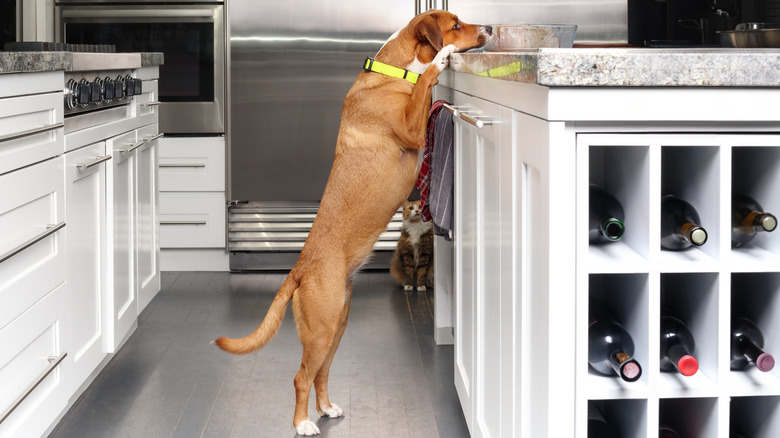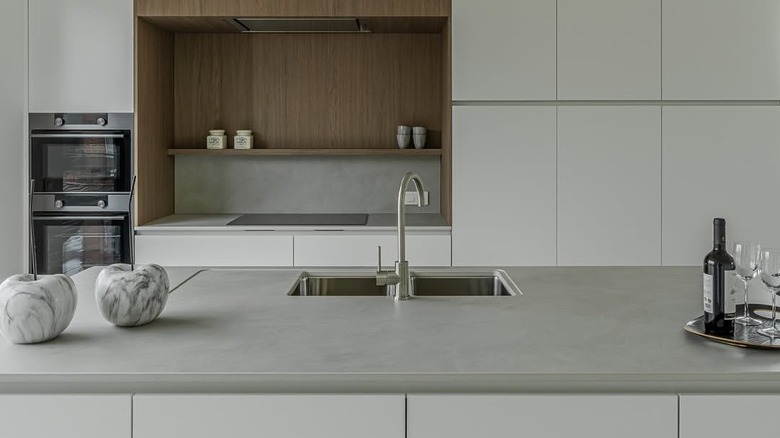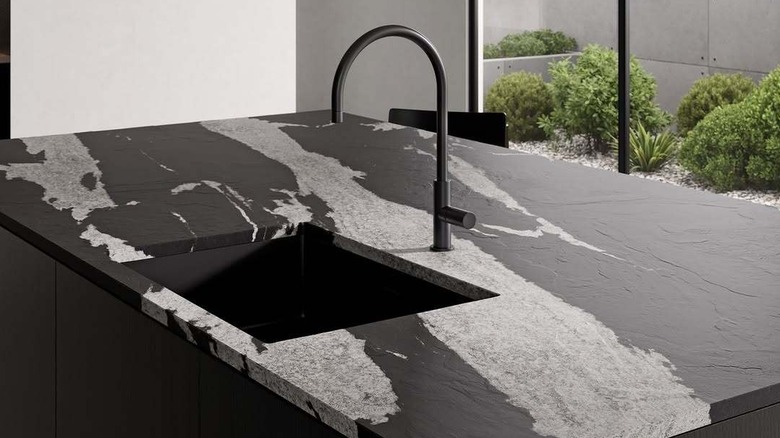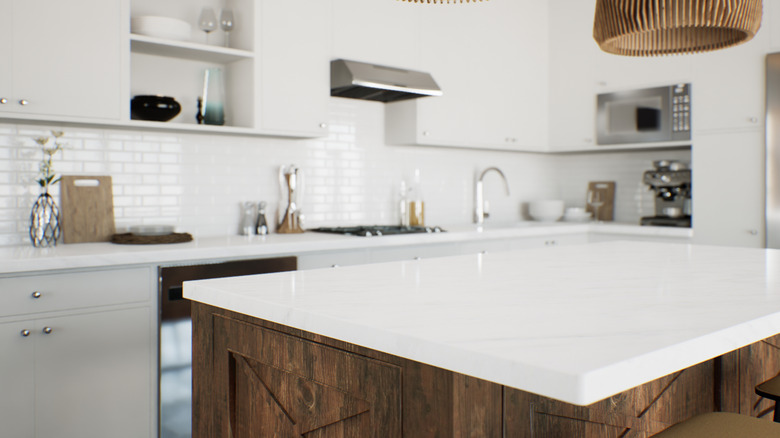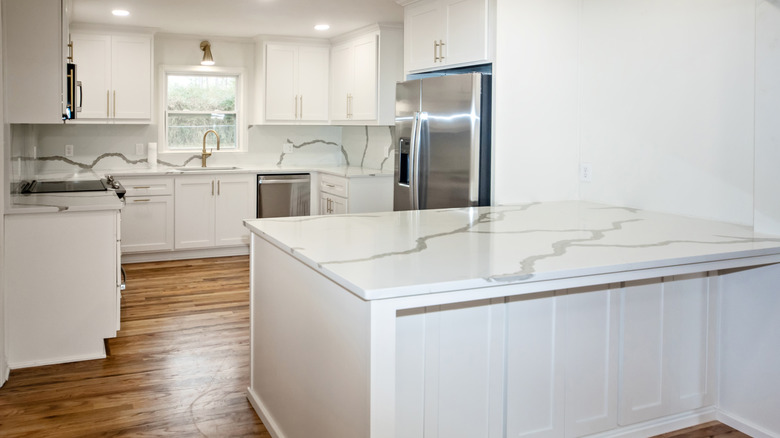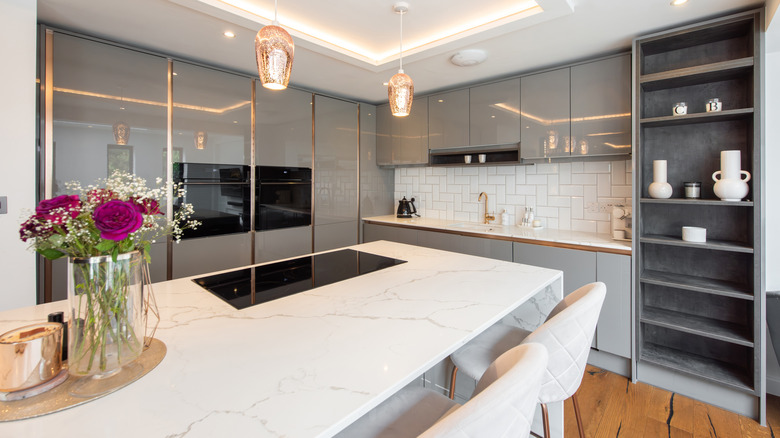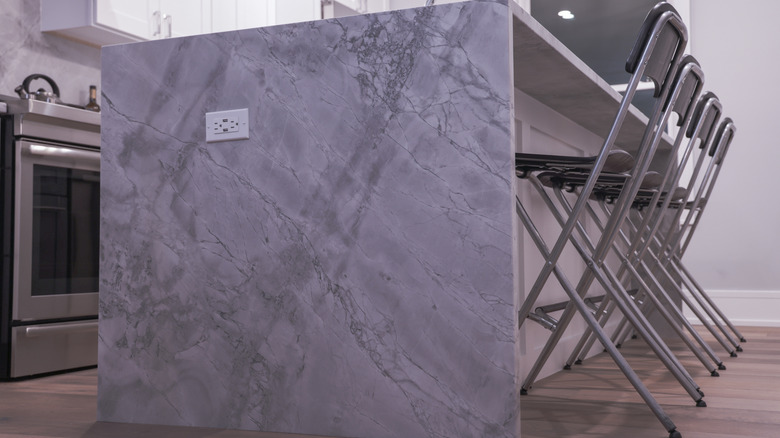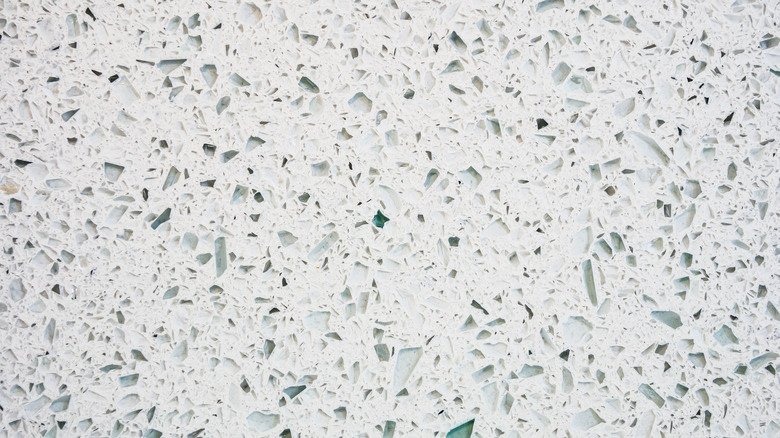Countertop Material Options That Are Best For Pet-Friendly Homes
Pets aren't supposed to be on the counters, but in reality, you can't monitor them 24/7. Cats hop up when you aren't looking, while Fido attempts to reach a plate of food that was left a little too close to the edge. Houses wouldn't feel like homes without our furry friends, but animals aren't without their quirks. If you're shopping for a countertop material, you'll want to ensure it can withstand their playful paws.
The best counters for pet-friendly homes will be scratch-proof, stain-resistant, and easy to clean. Although some stones are popular for their durability, it doesn't mean they have what it takes to look pristine in a house with animals running around. For example, marble countertops have a hidden downside if you have pets. While they can withstand normal wear and tear, this softer stone is classified as a 3 to 4 on the Mohs hardness scale. This means it's barely tough enough to withstand a scratch from a fingernail, so a determined cat can easily leave behind a few marks. Similarly, stainless steel may seem sturdy, but it's a malleable metal that animals can easily scratch or dent. Other popular countertops like unsealed concrete are made of porous materials, so if Fluffy knocks something over, it can seep into their surfaces and permanently stain them. Even the best-behaved pets have off days, but the countertops below will give you more peace of mind in the moments when you can't keep your eyes on them.
Dekton is nonporous and doesn't require a sealant for maintenance
Dekton is one of the most durable countertops you can find on the market, and it offers several advantages if you have pets. It's made through a process of fusing together tiny particles of raw, natural materials, such as quartz, porcelain, and glass. After manufacturers expose the blend to high heat and pressure, they rapidly cool it to create an ultra-compact, rock-hard, and nonporous surface. For pet owners, this means cleaning up spills is a breeze, and you won't have to worry about staining. Because it doesn't require any sealants, you can also use any of your usual cleaning products without worrying about etching or discoloration. If you have a cat that tears its claws into anything but a scratching post, Dekton can also resist the sharpest scratches. In fact, it's four times less likely to scratch than quartz!
There isn't much a pet can do to damage Dekton, but these high-end qualities come with a premium price tag — typically $80 to $150 per square foot. Unfortunately, because it must be installed by a professional, you won't save money by doing it yourself. It's rare for this durable surface to chip, but if it does, any significant repairs will also require the attention of a specialist. However, because it can withstand wear and tear better than most other countertops, it can last decades or more. So, if you want a high-quality countertop that looks pristine even with the accidental spills and paw prints, Dekton may be worth the upfront cost.
Neolith is easy to keep clean and is stain-free
Like Dekton, Neolith is an incredibly durable type of manufactured stone made from a blend of natural materials like glass, clay, granite, and natural oxides. Once the materials are fused under high heat and pressure, they become a nonporous surface that's free of resins and polymers. Since it's durable and nonporous enough not to need sealants, it's easy to keep your counters stain-free even if your curious kitty swats at a half-drunk glass of cabernet. Plus, its pore-free surface prevents liquids or food particles from seeping in and harboring bacteria, while pet hair, dander, and dust mites wipe away with ease. For the most scratch resistance, opt for a matte or satin finish. Polished Neolith is more prone to scratches, so steer clear of glossy options if your cat or dog is likely to leave behind their claw art.
However, its longevity means it costs more than many other options, at about $60 to $105 per square foot. It's a lesser-known countertop material that can be hard to come by in certain areas, so it may not be an option where you live. Although it's a tough surface, it can crack or chip if it isn't handled properly, so it's best to leave the installation to a professional. Repairing the damage will cost a pretty penny, and you may even need to replace the entire piece.
Glazed lava stone is extremely durable and resists discoloration
Every animal lover knows that the moment you're focused on something else, that's when your beloved pet seems to have a sudden burst of energy. For example, you're in the middle of cooking breakfast when you notice your dog sniffing around the set table, ready to steal something off a platter. In your hurry to shoo them away, you accidentally set the hot pan directly on the counter. Because glazed lava stone can withstand higher temperatures than your average oven or stove, you won't have to worry about finding scorch marks. Considering the material comes from actual cooled lava, it's no surprise that it can handle extreme heat. It's also another completely nonporous surface, so coffee spills from a startled cat or a swipe of a dog's paw are no match for lava stone. This also means there are no mysterious stains or lingering odors left behind.
The main drawback of glazed lava stone is its price. Averaging $250 to $350 per square foot, it costs more than nearly any other surface on the market, even Neolith and Dekton. Because it has to be shipped from volcanic areas, a large portion comes from the shipping cost. There are also a limited number of suppliers, so its rarity ups the price while making it more challenging to find.
Quartz is durable and resistant to scratches
Quartz is one of the most popular countertop surfaces, and for good reason. Among its most appreciated attributes is its durability, with its high 7 out of 10 ranking on the Mohs hardness scale. So, if your large, but hyper, dog barrels into the counter and a heavy object falls on it, quartz is less likely to chip or crack than some other stone surfaces. Made with around 90% ground quartz combined with resins, this nonporous surface is easy to keep clean, even if your pup excitedly slaps muddy feet on the counter. Quartz is pretty resistant to scratches, so the average cat zoomies may not leave a mark. However, it's not totally scratch-proof. So, if kitty digs her sharp claws in hard enough, you may need to use a polishing compound to make it look new again.
While quartz isn't the cheapest option at $40 to $100 per square foot, it's more cost-effective than options like lava stone. It's a good choice if you want something more pet-proof than laminate, but don't want to splurge on a counter that's 10 times the price. The main downside for pet owners is that highly acidic or alkaline products can damage the surface. So, if your pet knocks something like lemon juice over and it isn't cleaned immediately, you may come home to a discolored countertop. This also means you'll have to be careful about choosing the right cleaners to take care of any pet messes.
Porcelain stays pristine even when exposed to messes
Porcelain is used in a wide range of applications, known for being scratch-proof, stain-resistant, and able to withstand harsh chemicals. For pet owners, attributes like this are a must since spilled water bowls, sneaky food swipes, and muddy feet are part of everyday life. Although porcelain can handle most cleaning chemicals, they aren't really necessary; everyday pet messes are easy to wipe up with a soft cloth and soapy water.
Despite being a material that can hold up well against even the most rambunctious animals, porcelain may not cost as much as you'd think. The typical price range per square foot falls between $55 and $120, which can be cheaper than many countertops with the same qualities. If you're debating porcelain vs quartz, choose porcelain if you have a kitchen with a ton of windows since UV rays won't cause it to discolor. On the other hand, porcelain is a thinner material that cracks more easily than quartz and other hard stones. So, if you have a large dog that may attempt to jump on the counter if he notices food while you're distracted, it's better to go with something more durable.
Quartzite isn't easily scratched by cat claws
Although the two have similar-sounding names, there are a few key differences between quartzite and quartz countertops. While quartz countertops are manufactured thanks to the addition of resin, quartzite is natural. It starts out as sandstone, a metamorphic rock formed from sand-sized mineral grains. Once the small grains of quartz, feldspar, or other rocks are naturally exposed to high heat and pressure over millions of years, they recrystallize into the beautiful, durable, and scratch-resistant quartzite. If kitty runs across the countertop to escape Fido, you typically won't have to worry about a trail of cat scratches or a crack from a playful pup. That said, quartzite isn't completely indestructible, so if your cat digs her claws in as she pulls herself up, you may find the evidence in the form of scratches later.
The cost of quartzite varies and can be anywhere from $30 to $150 per square foot, though thicker slabs will fall on the higher end. Aside from the price of more durable slabs, the main con of quartzite is its maintenance. Without regularly resealing, your countertops will be more prone to scratches and staining. With pets, it's even more important to stay on top of the upkeep. Otherwise, your reminder to reseal may be a stain from a pet spill that has worked its way into the worn-down sealant while you were running errands.
Recycled glass stands up to pet spills
There's a lot to love about recycled glass countertops. They're durable, environmentally friendly, and can take the occasional swat from a dog or cat paw. As the name suggests, each of these countertops is typically made from 70% or more of recycled glass from windows, bottles, and other items. Because glass itself is nonporous, the surface is incredibly easy to clean, and acrylic-binder surfaces don't require sealants. Even if your pets aren't allowed on the counters, you may notice that their fur still somehow gets into every nook and cranny. With these countertops, you'll have one less area for their dander to settle into, and any spills will bead up rather than seep in. So if you check your pet cam to see them making a mess while you're out, at least you know it won't leave a lasting stain.
The main downside of installing recycled glass countertops isn't just their susceptibility to damage, but the high cost of repairing any cracks or chips. If a cat jumps onto the edge of a heavy object and tips it over onto the counter, you could end up with a costly repair or even need a replacement. They can also be pricey, ranging from $65 to $250 per square foot, especially if you opt for extra durability and stain resistance. Additionally, if you choose a cement-binder type, you'll have to keep up with resealing the surface once or twice per year to keep it stain-resistant.
